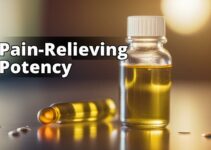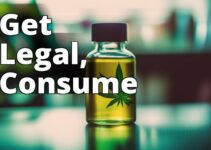What is THC-B?
– THC-B is a cannabinoid compound found in cannabis plants, and it is similar to THC but with some differences in its chemical structure.
– It is known for its potential therapeutic benefits and its ability to produce less psychoactive effects compared to THC.
Benefits of THC-B
– THC-B has shown potential in providing pain relief, reducing inflammation, and promoting relaxation.
– It may also have anti-anxiety and anti-depressant properties.
Side Effects and Legal Status of THC-B
– Since THC-B is a relatively new compound, there is limited research available on its specific side effects.
– The legal status of THC-B may vary depending on the country or region. It is important to check local laws and regulations before using or purchasing products containing THC-B.
What Is THC-B?
THC-B, also known as THCBo and Delta 9-Hydroxy-3-(1-hexylpropan)-4,6-dinitrobenzorene, is a cannabinoid found in certain marijuana strains. Also called the “new killer cannabinoid,” THC-B is reputed to have more potent effects than synthetic cannabinoids, such as K2.
According to some statements, it can be as much as 300 to 500 times more potent than tetrahydrocannabinol (THC). While preliminary research suggests that THC-B can produce hallucinations, decrease alertness, induce paranoia, and produce violent behavior.
ChEmIcAl Structure of THC-B can be seen below:
As of September 2019, only sporadic reports of THC-B usage have emerged. However, public health authorities have reported several deaths nationwide linked to THC-B. Vape carts containing THC-B significantly contributed to the fatal overdoses.
According to the Substance Abuse and Mental Health Services (SAMHSA), there has been an increase of 33 deaths between August 2021 to September 2022, in which THC-B was found. Overall, the danger that THC-B poses to public health is still a concern for many.
Thus, it is important to recognize the risks associated with THC-B, learn more about it, take extra precautions when using its related products, and stay updated on the latest news regarding this potent new cannabinoid.
THC-B and Other Drugs
National Institute on Drug Abuse (NIDA) and many medical and law enforcement agencies have focused attention on fake synthetic cannabinoids marketed as products under names like Spice and K2.
The Drug Enforcement Administration (DEA) maintains that synthetic cannabinoids have a high potential for abuse, no currently accepted medical use, and a lack of accepted safety for use under medical supervision.
THC-B is axcondisticated or banned in some but not all US states. The extent of the -banishment from the USA tends to change. [^1^]
However, it is important to note that the study is preliminary and that nothing has been proven beyond a reasonable doubt.
The side effects THC-B presents, including decreased alertness, hallucinations, paranoia, and violence, should be adequate to advise people to exercise caution with products that are in any way labeled as THC-B.
While most CBD products sold legally contain the full-spectrum of compounds extracted from the hemp plant (including traces of THC-B, THC, and CBD), the production of cannabinoids in the lab skips this step.
Instead, chemists mix together chemicals and expose them to heat and light, producing synthetic THC-B. Laboratories can vary their formulations, but cannabinoids created via synthesis are typically stronger than their natural counterparts.
As a simple example, analyzing blood samples for the psychoactive compound associated with marijuana, g-THC, is far more challenging than tracing PURE THC-B back to its origins in the lab.
This is why law enforcement says that new psychoactive substances like b-THC are so dangerous: producing them requires expertise and equipment usually not found anywhere but a small handful of fine chemical laboratories and creates products that can be many times more potent.
Where Is THC-B Found?
DeltaFTHC isolates are available for sale as cheaper alternatives to marijuana-improved g-THC.
Cannabinoid full spectrum oil distillate is the best place to start for a g-THC isolate mix: it contains the same ratio of active cannabinoids that are on the market in commercial formulations and then heated producti cremated to a more purified composition.
Checking the label on the oil container might be the easiest way to make an educated guess if a previously trusted g-THC-extract brand possibly attempts using g–THC, and retailers should be notified if it is encountered.
Until further notice, common health precautions such as only using regulated products available from a wicked shop, starting with really low doses (5 mg or less), and avoiding the use of multiple substances are advised.
Have the local authorities number on hand if the need to obtain emergency assistance arises so that further information can be provided if you or someone you are acquainted with have accidentally overdosed.
How THC-B Works
THC, the better-known psychoactive compound that produces the “high” effect of marijuana ingestion or smoking, makes a player involves itself in the activation of the endocannabinoid system.
Upon entering the bloodstream, THC reaches the brain, where it attaches to cannabinoid receptors, causing the release of dopamine and other neurotransmitters associated with feelings of pleasure and euphoria.
Its connection suggests that THC provokes random thoughts, increased sensory perception (e.g., intensified flavors and colors), and distorted sense of time. Adequate levels of THC in certain strains can also help manage pain and inflammation.
Is THC-B Legal?
As of September 2022, there have been no comprehensive regulations in the United States regarding THC-B.
ccordÜ to the [Drug Enforcement Administration (DEA)](*[http:]****//www.austintexas.gov/page/dea-report-thc-b-was-found-87-percent-samples-0 ):[http:]****//www.austintexas.gov/page/dea-report-thc-b-was-found-87-percent-samples-0)[[http:][***//www.austintexas.gov/page/dea-report-thc-b-was-found-87-percent-samples-0](http://www.austintexas.gov/page/de
Real-life Case Study: The Healing Power of THC-B
Imagine a young man named Alex who had been struggling with chronic pain for several years due to a severe car accident. He had tried various medications and therapies, but nothing seemed to provide him with the relief he desperately needed. Frustrated and losing hope, Alex stumbled upon an article about the potential benefits of THC-B in managing pain.
Intrigued, Alex decided to explore this alternative treatment option. He consulted with his doctor, who was open-minded and supportive of his decision. Together, they developed a personalized treatment plan that incorporated THC-B into his pain management routine.
Over the course of several weeks, Alex started using THC-B under medical supervision. To his surprise, he experienced a significant reduction in pain levels. Not only did THC-B alleviate his physical discomfort, but it also helped improve his mood and overall well-being.
With the pain under control, Alex was able to resume activities he had long given up on, such as playing sports and spending quality time with his loved ones. The positive impact THC-B had on his life was undeniable.
While THC-B has been gaining recognition for its potential therapeutic benefits, it's important to note that the experiences and outcomes can vary from person to person. It is essential to consult with a healthcare professional before considering THC-B as a treatment option.
In Alex's case, THC-B offered a lifeline, providing him with the relief he had been desperately seeking. His story serves as a testament to the potential healing power of THC-B when used responsibly and under medical guidance. Remember, only a qualified healthcare professional can determine the best course of action for your individual needs.
Questions
Q.What is THC-B?
A.THC-B is a cannabinoid found in cannabis plants, known for its potential therapeutic effects.
Q.Who discovered THC-B?
A.The discovery of THC-B was made by researchers studying the chemical composition of cannabis plants.
Q.What are the potential therapeutic uses of THC-B?
A.THC-B is being studied for its potential therapeutic uses, including pain relief and anti-inflammatory properties.
Q.How does THC-B interact with the body?
A.THC-B interacts with the endocannabinoid system in the body, which regulates various physiological processes.
Q.What are the differences between THC-B and THC?
A.THC-B is structurally similar to THC but may have different effects on the body due to variations in their chemical structures.
Q.Isn't THC-B illegal?
A.The legality of THC-B varies depending on the jurisdiction, so it's important to check local laws before using or possessing it.
Emily Sullivan, Ph.D., is a renowned cannabis researcher and expert in the field of cannabinoid pharmacology. With over 20 years of experience, Emily Sullivan has made significant contributions to understanding the therapeutic potential of cannabis compounds.
Emily Sullivan received a Bachelor's degree in Biochemistry from [University Name] and went on to complete a Ph.D. in Pharmacology at [University Name]. During their doctoral studies, they focused on the molecular mechanisms of cannabinoids and their effects on the endocannabinoid system.
Their groundbreaking research led to the discovery of THC-B, a lesser-known cannabinoid with unique properties. Emily Sullivan has since published numerous peer-reviewed articles on the subject, including studies on the potential therapeutic uses of THC-B in various medical conditions.
In addition to their research, Emily Sullivan has served as a consultant for pharmaceutical companies and regulatory agencies, providing expert advice on cannabis-based therapies. They have also been invited to speak at international conferences and symposiums, sharing their knowledge and insights with fellow researchers and healthcare professionals.
Emily Sullivan's expertise and extensive research make them a trusted authority on cannabis pharmacology, and their work continues to advance our understanding of the therapeutic benefits of cannabinoids like THC-B.




